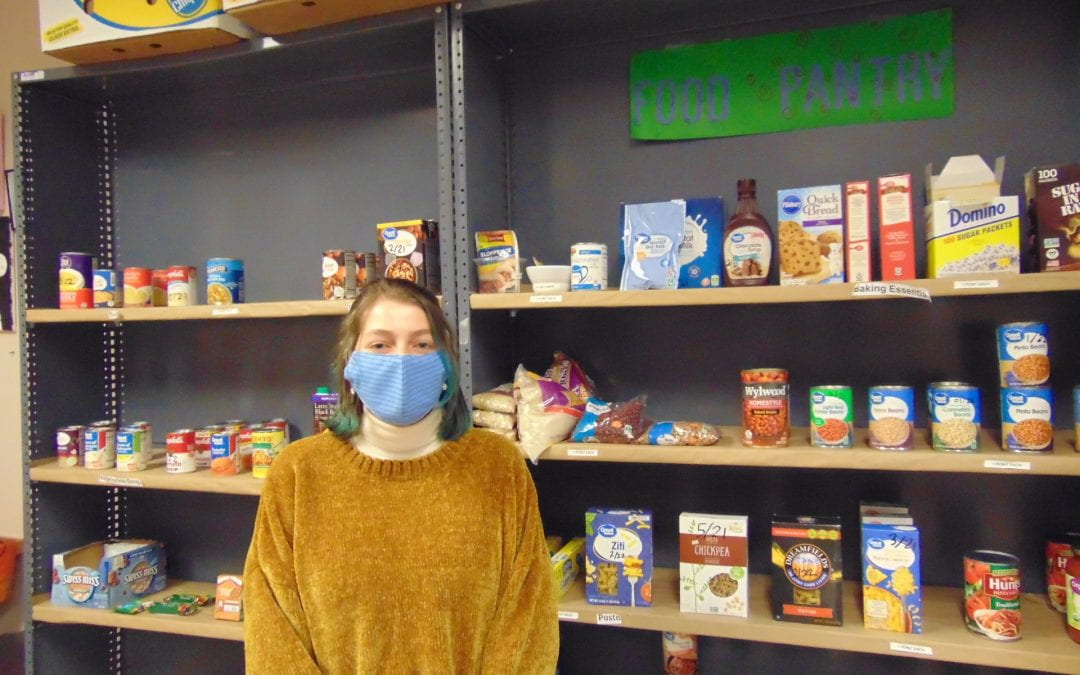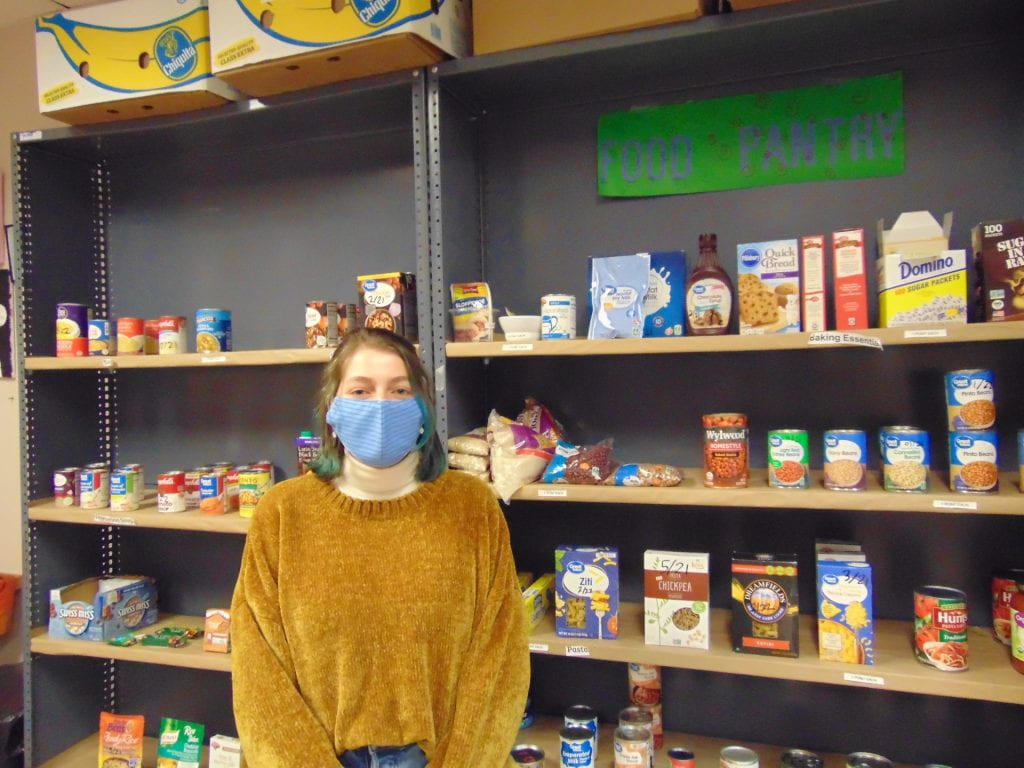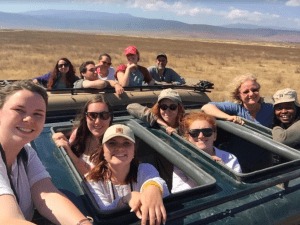Dec 16, 2021 | Exclusive, Feature, News |
By Paige Lusczyk, contributing writer
The Sustainable Campus Coalition (SCC) celebrated its 20th anniversary on Oct. 29th in the Landing. UMF’s President Serna spoke at the event.
President Serna congratulated the SCC for creating an impact at UMF. “…Walk around this campus-especially as a tour… as outsiders-and you really start to feel the impact you have had on the physical campus,” Serna said.
President Serna continued to list off the accomplishments of the SCC including the biomass plant, the community garden, the Thrifty Beaver, and the wells. The wells were installed in 2012 as ground source heating. The Biomass plant was completed in 2016 and will replace about 390,000 gallons of heating oil previously used annually. The Thrifty Beaver was also established in 2016, an active place for those who need help with food insecurity. The community garden was established last year to also raise awareness of food insecurity on campus while supplying organic produce to the community.
The SCC was founded in 2001 with an original focus on the Education Center and its Green design. Today, “the mission of the SCC has expanded to include public education, collaborations with the community, environmental planning associated with greenhouse gas emissions, improvement of recycling on campus, encouragement of local food, institutional composting, and sustainable transportation.”
“It’s not just how [the SCC] shaped the physical campus, I think it is also how [the SCC] shaped our values and culture here on campus,” President Serna said.
UMF’s Campus Sustainability Coordinator, Mark Pires, thanked all alumni and current students involved with the SCC over the past 20 years, then everyone else that were heavily involved in the project. “SCC projects and activities are driven by the interests and passions of UMF students who work in collaboration with a team of dedicated faculty, staff, and community members,” Pires said.
The SCC meets on Mondays from 11:45 a.m. to 1 p.m. in room 113 in the Education Center. Please contact Pires at edward.pires@maine.edu for more information.

Nov 12, 2020 | Uncategorized |
By Madison Archer, Contributing Writer

Twilight Smart-Benson, one of the Thrifty Beaver’s student workers. (Photo courtesy of Sam Shirley)
In the basement of the Fusion Center there is a room filled with donated supplies. Clothes, food, kitchen supplies, school supplies, textbooks and personal hygiene items. The Thrifty Beaver (TB) is a student-run food pantry and clothing exchange, aimed at helping UMF students “not fall through the cracks” said Mark Pires, Interim Sustainability Coordinator.
The Thrifty Beaver (TB) has made some compromises in how it is run to ensure safety is possible for students. Reduced hours and limited stock have proven to be struggles for the Thrifty Beaver.
Although new to campus, Pires has been hard at work along with its dedicated student workers trying to help the “Thrifty” get ready for students to utilize during the pandemic. Pires and the student workers have had to put away some items, like kitchenware, due to concerns of touching and passing items around. They also shut down the fitting room where students could try on the clothes that have been donated.
There is only one person allowed in TB at once and there is space in the hallway for students to wait as well. Things like prearranged hygiene bags are ready for TB customers to grab and go.
TB relies on donations from the UMF community and the Farmington community. “Typically our funds are given from the school. So we will have a once a month, big shopping trip that is school funded. That allows us to supply food to all kinds of students,” said Chelsea Roy, a sophomore environmental science and anthropology major. Roy is also involved with Sustainability Campus Coalition (SCC) which is the group that manages Thrifty Beaver.
In the past, donations have come in from current students, alumni, professors, The United Way and The University Credit Union. Alumni acknowledge the significance of the Thrifty Beaver. “Alums come in still,” said Roy. “I ran into an alum my last shift! She recognized that the Thrifty was a really vital resource and she came back to donate food.”
There are about a half dozen students employed by TB in addition to volunteering students. Pires had nothing but praise to give to the students who have been keeping the TB open. “As I become more familiar with the members of the SCC, I think that their devotion and commitment to keeping the Thrifty Beaver up and running even during COVID times is really impressive,” said Pires.
Both Pires and Roy agree that the TB is important to the campus and its students. “You know many students are on very tight budgets,” said Pires. “Here and at other campuses they might not have the resources for a full meal plan every semester. I think organizations like the SCC and TB fill an important role and need.”
Some upcoming projects that the TB is working towards includes making a commercial to feature well-known figures on campus. The other project is revamping their website to include an updated catalog of their inventory.
The Thrifty Beaver is located in the basement of the Fusion Center. They’re open Thursdays and Sundays from 4 p.m. to 7 p.m.

Oct 10, 2019 | News |
Derek Taber Contributing Writer
Nine students are set to embark on a journey to the nation of Tanzania in East Africa where they will learn the impacts of tourism on the local communities. Eco tourism is a form of travel that involves visiting areas of pristine countries, with the intention of conserving the environment, and minimizing the footprint of conventional travel.
Professors Linda Beck and Mark Pires are the two instructors leading the excursion in Jan. 2020. Together Beck and Pires are taking the students to Tanzania for thirteen days to ingratiate them with a set of principles that will help them understand the philosophies of ecotourism.
Learning the impact on the local economy while traveling is the main philosophy that Beck hopes to instill. “In the context of Tanzania, I want to help the students understand the tourists’ roll as consumers with the sustainability of our purchases,” said Beck. “One has to be really careful of how they spend their tourist dollars.”
Large tourist corporations will move into an area and exploit the local communities, adding pressure to the already limited supply of resources. Most tourism companies are owned by foreign investors and keep the profits in foreign markets. Companies will add infrastructure, and put a drain on environmental ecosystems by building roads, and supply lines to keep the tourist well stocked.

Photo captured from the Tanzania Trip held in 2016. (Photo courtesy of Linda Beck)
“People will go off-road on safari creating a havoc to the flora and fauna, but also amongst the animals,” said Beck. The money is kept in the deep pockets of the companies and does not get redistributed. “You want to make sure the dollars you spend actually go to the local economy,” said Beck.
Thomson Safari, a tour company based in Massachusetts that leads Tanzanian safaris, had a lawsuit filed against them in 2010 by the local communities after the denizens were forced from their land and blocked from a vital water supply. Thomson was building luxury safari camps.
“The exploitation of the environment, and the people is widespread,” said Beck.
Another goal on this winter trip is to meet with local environmentalist, and observe the local ecotourism operations. The group hopes to actually engage in ecotourism as well. Beck said, “When we hike Kilimanjaro, when we go on safari, when we visit coffee farms, all of those activities will be done in a sustainable manner.”
Nelson Peterson is a student who is going on the trip to Tanzania in December. Peterson has never been to Africa before and hopes to learn what ecotourism can do for communities around the world. “It will be nice to see how other people live in a different country,” said Peterson, who is excited to help with the Porters Association.
Helping bring water to dryer areas, and lug buckets over long paths to remote villages throughout the Serengeti is a special opportunity to him. “It will be really important to help the porters, part of our trip will be to help them [Porters association] bring water to places,” said Peterson.
The impact of learning the importance of environmentally responsible behavior while traveling is the most valuable takeaway from the journey to East Africa for Beck. “Watching the students get excited about Tanzania,” she said, “[and] learning how to become a global citizen,” is something that one can take with them forever.


